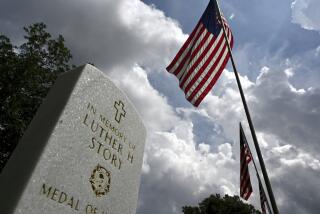Unheralded Veterans Found in Australia
- Share via
SYDNEY, Australia — Col. Ike Austin, “champion rifle shot of the world,” astonished Australian audiences in the 1880s with his William Tell act, shooting apples off his wife’s head and potatoes out of her mouth.
Then his aim got shaky and his wife walked out. He fell into poverty and died, just another unheralded American who had fought in the Civil War.
Unheralded, that is, until Roy Parker, a retired U.S. Air Force major, and colleagues in the private American Civil War Research Group found his unmarked grave in a Sydney cemetery under his true name, Isaac Putnam Smith. They honored him with a headstone supplied by the U.S. Department of Veterans’ Affairs.
Hundreds of American veterans came to Australia after the Civil War, to seek their fortunes in the gold fields, because the Confederacy lost, or because they were fleeing either the law or bad marriages.
Parker and his friends, driven by a fascination with history and compassion for the forgotten veterans, started tracking them down 14 years ago.
When the quest began, only three graves of Civil War veterans had been identified in Australia. Parker’s group has found 90 more and obtained 30 plaques and tombstones from the U.S. government for those that were unmarked.
The most colorful of all was Smith, a sergeant in Company G, 84th New York Infantry (14th Brooklyn), who was an expert rifle shot.
Adopting the stage names, and rank, of Wild Ike and Col. Ike Austin, Smith earned the great sum of 100 pounds a week performing with the St. Leon Circus, Later, he leased a pavilion at the Bondi Beach aquarium, where his stray shots would vanish over the Pacific.
“Col. Ike Austin, the American marksman, is at present shooting potatoes out of his wife’s mouth and driving tacks into a board,” the Bulletin magazine of Sydney reported in March, 1889.
“Any drinking gentleman who wants the pimples shot off his countenance and his hair cut with ammunition at 50 yards range will please apply to the colonel at once.”
Wild Ike wowed crowds in Australia, England, Europe, India, Shanghai and Hong Kong, performing such feats as knocking the ash from a cigar held in a companion’s mouth, piercing a deck of cards held in a bystander’s hand and snuffing out lighted candles.
Ike’s aim finally failed, his wife left and his fame faded. He spent his last 10 years in a nursing home for the poor and went to a pauper’s grave.
Parker and his friends found their way to Smith’s grave through word-of-mouth tales, obituaries after his death in 1908 and an 1899 U.S. government pension list. He now has a tombstone of Alabama marble and a place of honor in Rookwood Cemetery.
George Johnston Fairweather, of the 4th Maine and later the 19th Maine, survived the fiercest battles of the Civil War only to die in Australia, also in 1908, as a lonely bachelor.
“This poor old man, they found him dying in a hut near Bowral” southwest of Sydney, Parker said.
“The constable came out in the middle of a winter’s night, in the wind and rain, and picked him up and took him by wagon 24 kilometers to the Bowral hospital, where he died of pneumonia.
“He had nothing on him but a letter to the U.S. consul,” Parker said. “The letter said he had been in the Civil War, mentioned all the battles and men in his regiment, and he was wondering about his pension.”
Fairweather survived the First Battle of Bull Run, the siege of Williamsburg, Second Bull Run, Antietam, Fredericksburg, Gettysburg, the Wilderness and half a dozen lesser engagements.
In the end, Parker said, “The poor old guy, he had no friends or anything.”
Anyone who has information about Mexican War or Civil War veterans who went to Australia can reach Roy Parker at 41 Churchill Road, East Killara, New South Wales, Australia 2071.
More to Read
Sign up for Essential California
The most important California stories and recommendations in your inbox every morning.
You may occasionally receive promotional content from the Los Angeles Times.













